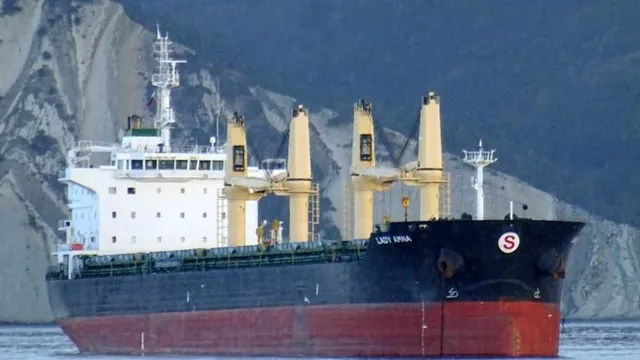
Russian ship with massive explosives docks in Great Yarmouth today
2024-10-28 19:30- The Ruby cargo ship, loaded with 20,000 tonnes of ammonium nitrate, is set to dock in Great Yarmouth, UK, on October 28, 2024.
- Prior to arriving in the UK, the ship was refused entry by several countries, including Norway, due to safety concerns related to its explosive cargo.
- Local residents are anxious about the ship's presence, but UK officials assert that the cargo is safe, emphasizing ongoing geopolitical tensions.
Express your sentiment!
Insights
On October 28, 2024, the Ruby, a Russian cargo ship loaded with 20,000 tonnes of ammonium nitrate, is scheduled to dock at Great Yarmouth in the UK. This amount is significantly higher than the 2,750 tonnes that caused the catastrophic Beirut explosion in 2020. This vessel has faced entry refusals from multiple countries due to safety concerns regarding its explosive cargo, leading to its previous anchorage off Margate, Kent. The ship was initially in Tromso, Norway, before its journey to Las Palmas in the Canary Islands, though authorities raised alarms due to damage sustained in the vessel’s propeller and hull. The cargo, originally en route to Africa, is characterized as safe, according to UK officials. However, local residents express heightened anxiety regarding its proximity to populated areas, including a university and hospital, prompting increased scrutiny. Despite the cargo being classified as safe by officials, there are ongoing negotiations for unloading, and the ship’s legal situation does not involve any international law violations, as neither ownership nor flagging is Russian. Concerns about the ship's safety have escalated amid rising tensions with Russia, particularly due to the ongoing conflict in Ukraine, increasing the urgency for careful monitoring of maritime activity. This incident reflects broader geopolitical dynamics and the critical assessment of safety protocols, as nations remain wary about large quantities of explosives being transported through or near their territories.
Contexts
On April 17, 2013, a catastrophic explosion rocked the small town of West, Texas, when the West Fertilizer Company facility erupted, drawing national attention to the oversight and regulation of agricultural fertilizers. The incident resulted in questions regarding compliance with safety regulations, as it was reported that the facility had failed to notify the Department of Homeland Security (DHS) about the ammonium nitrate it stored. This failure highlighted a significant gap in communication among regulatory agencies that was vital for ensuring safety amid concerns over potential misuse of hazardous materials. Ammonium nitrate, a common component in fertilizers, can also be transformed into powerful explosives. This dual-use nature has prompted increased scrutiny of its storage and transportation, particularly in light of past incidents, including the Oklahoma City bombing. In 2007, Congress attempted to tighten regulations surrounding ammonium nitrate with the Secure Handling of Ammonium Nitrate legislation, empowering DHS to regulate its sale and transfer. However, as of 2021, relevant rules were still under review, leaving a dangerous regulatory void. The tragic explosion in Beirut in August 2020 reignited calls for strengthening ammonium nitrate oversight in the United States, drawing parallels between the negligent storage in Beirut and risks faced by facilities across the country. Critics argue that federal agencies like OSHA and the EPA have not only failed to enforce existing regulations but have also neglected to inspect many facilities adequately. The West Fertilizer Company had not been inspected for nearly 30 years before the explosion, emphasizing a critical need for reform. In the aftermath of the West tragedy, the Chemical Safety Board noted numerous facilities nationwide continue to pose similar risks. With outdated regulations allowing dangerous storage practices to persist, advocates urge federal action to prevent future catastrophes. Katherine Lemos, head of the CSB, expressed hope that recent tragic events would catalyze a renewed commitment to improving the handling of hazardous materials, to protect lives and avert further disasters.